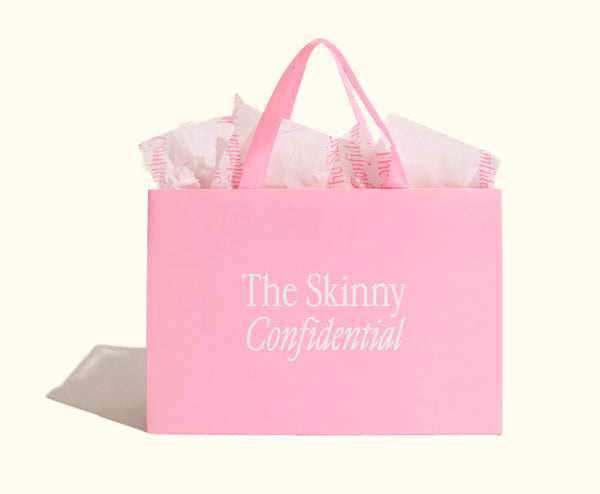
We all want our faces to be soft, smooth, and even a little glowy. And chances are, you already have some sort of routine in place to reach those goals.
But out of all the areas on your body, the skin on your face is exposed to different kinds of elements. Environmental stressors, pollutants, sun exposure—all of which can damage, dull, and dehydrate your skin over time.
That’s why a targeted skincare routine is essential for keeping your face moisturized, healthy, and hydrated. And the best time to follow that routine? At nighttime.
When you stick to this routine in the evening, it gives your skin the chance to rest from external stressors while really locking in that moisture.
But not all products and regimens are created equal. To help you create an effective routine, we’re sharing our top tips for getting glowy, hydrated skin overnight.

How to Hydrate Face Overnight for Dewy, Glowing Skin
When your skin is hydrated, it not only looks and feels amazing but also functions as a stronger barrier. Because your skin is the first line of defense against toxins and pollutants, skincare is so important for our overall health and wellness.
Achieving hydrated skin impacts how we look and feel, both inside and out. In this post, we’ll explore what causes dry skin, how to recognize it, and effective ways to support long-term hydration.

What Causes Dry Skin on Face?
Cold Weather
Cold air actually holds less moisture than warm air, meaning the air will pull the moisture from your skin. And this makes sense when you consider how stiff and dry your face may get in the winter. Plus, indoor heating at home, at work, or in your car dries out the air even more. In those colder months, your skin is really fighting a losing battle for moisture.
Sun Exposure
Our founder, Lauryn Bosstick, literally wrote the book on why the sun is the worst for your skin. (Definitely grab a copy of Get the F*ck Out of the Sun). Sun exposure can damage your skin in several ways, including stripping it of essential moisture.
How? UV rays break down collagen and lipids, which help your skin stay hydrated and plump. On top of that, sun exposure increases water loss by weakening the skin’s barrier and triggering inflammation. And, inflammation = heat = evaporation = sad, dehydrated skin.
Wind
As the wind blows across your face, it literally whisks away surface moisture. Harsh winds can also damage your moisture barrier and cause inflammation, leading to more water loss.
Hot Showers or Baths
We all love a hot shower or bath, but hot water isn’t great for your hair or skin. It strips away natural oils, weakens your skin’s moisture barrier, and can trigger inflammation. Plus, the heat increases evaporation as you dry off, leading to even more water loss.
Bottom line: Stick to lukewarm water when you shower or bathe. If you’re craving heat, opt for a sauna sesh instead. That kind of environment is actually good for your hydration goals. Here’s more on the benefits of sauna for your skin.
Dehydration
If you’re not drinking enough water, your body will tell you . . . and so will your skin. Every system in your body needs water to function properly, and when hydration is low, your skin ends up at the bottom of the priority list.
Dehydration affects your skin at the cellular level—slowing repair, weakening the moisture barrier, and reducing overall hydration. You can apply all the hydrating products you want, but until you start hydrating from within, it’ll just feel like an uphill battle.
Poor Diet
The right nutrients are essential for deep hydration. Not only do they deliver water, but they also help retain it. And, as a result, you’re not dealing with nearly as much inflammation.
If your diet is missing healthy fats, water-rich foods, and nutrients like vitamin A/C/E, zinc, and selenium, you’ll probably notice skin dehydration.
Some of our favorite foods for skin health are:
-
Bone Broth (healthy fats and hyaluronic acid)
-
Mushroom Coffee (anti-inflammatory)
-
Cucumbers (water-rich and vitamin C)
-
Watermelon (water-rich and zinc)
-
Avocados (healthy fats and vitamin C/E)
-
Sweet Potatoes (vitamin A and C)
-
Tomatoes (water-rich and vitamin C)
-
Citrus Fruits (vitamin C)
-
Walnuts (healthy fats and selenium)
Health Conditions
This one might sound obvious, but certain health conditions can also cause dry skin. Of course, there are skin-specific disorders like eczema, psoriasis, dermatitis, ichthyosis, and rosacea. But other internal health issues can lead to dryness, too.
Conditions like hypothyroidism, diabetes, kidney disease, liver disease, and menopause can all affect your skin’s ability to stay hydrated. If you have a chronic health condition, it’s worth talking to your doctor about whether it could be impacting your skin and what you can do to manage it.
Incorrectly Used Skincare Products
Not every skincare product’s goal is hydration. Cleansers, exfoliants, acne treatments, toners, and more all have a purpose. However, if they’re overused, used improperly, or used in the wrong order, they can dry out your skin.
Look out for these products specifically:
-
Harsh or foaming cleansers:
These can strip your skin of natural oils and moisture. Instead, opt for gentle cleansers and try double cleansing instead.
-
Chemical exfoliants (like retinoids or strong acids):
Over-exfoliating or using these without layering hydrating products can damage your moisture barrier and leave skin feeling dry or irritated. For more information on this, check out our posts, “What Does Exfoliation Remove and Deplete?” and “What Happens If You Don’t Exfoliate Your Skin Regularly?”
-
Physical exfoliants (like scrubs or cleansing brushes):
Rough scrubbing can cause microtears, irritate the skin, and compromise the barrier that helps lock in moisture.
-
Alcohol-based toners (like witch hazel):
These can pull moisture from the skin if not followed by a hydrating toner or moisturizer. Look for alcohol-free alternatives when possible.
-
Acne treatments (like benzoyl peroxide or high-strength salicylic acid):
These target oil and bacteria, but overuse can dry out your skin. Always follow with a gentle, nourishing moisturizer.
-
Products with synthetic fragrance:
Fragrance can irritate sensitive skin and interfere with its ability to retain moisture. Choose fragrance-free products when possible.
-
Clay masks:
When used too frequently, clay masks can absorb too much oil and moisture, leaving your skin dry and unbalanced. Use them sparingly and follow with hydration.
Skipping Moisturizer
If your skin is naturally oily, you might think skipping moisturizer will help balance things out. But when your skin feels too dry, your body actually responds by producing even more oil.
So, don’t just strip your skin with harsh cleansers and toners. You need oil, serum, and moisturizer to support your skin barrier and keep oil production in check. That way, your skin stays balanced—not too oily, not too dry.
What Does Dry Skin on Face Look Like?
-
Flaky patches on the skin
-
Peeling around the nose, cheeks, or forehead
-
A dull or lackluster complexion
-
A rough or uneven skin texture
-
Redness and visible irritation
-
Fine lines or small cracks
-
Makeup that looks patchy or uneven

How to Hydrate Face Skin Overnight
Use a rich moisturizer with hydrating ingredients.
To hydrate your skin overnight, use a rich moisturizer. It’ll work with your skin’s natural repair cycle and seal in hydration. It should also help restore dry skin’s natural moisture barrier without interference from the sun or other irritants.
Look for ingredients like hyaluronic acid, colostrum, panthenol, glycerin, aloe, squalane, shea butter, or jojoba oil that’ll help pull and seal water into the skin. Here are some favorites and their hydrating ingredients:
-
Epicuren Colostrum Luminous Glow Cream: Glycerin, colostrum, aloe, and squalane, etc.
-
Barefaced Hydration Lotion: Niacinamide, caffeine, ceramides, tocopheryl acetate, etc
-
Dr. Dennis Gross Vitamin C Lactic Dewy Deep Cream: Glycerin, aloe, collagen amino acids, squalane, coconut oil derivatives, lactic acid, etc.
- Dr. Dennis Gross Hyaluronic Marine Oil-Free Moisture Cushion: Glycerin, collagen amino acids, aloe, coconut oil derivatives, lactic acid, etc.
Apply your skincare to damp skin.
If you want your face to get the deepest hydration possible, apply your skincare to damp skin. When your skin is slightly wet, it becomes more permeable, which basically means it's more absorbent. All your skincare products will penetrate much more effectively to deliver real, noticeable results.
So after you cleanse and wash your face, don’t completely dry your skin. Keep it just damp, but not dripping, so your products spread easily and lock in all that hydration.
Sleep with a humidifier in your bedroom.
Remember, dry air is the enemy of your skin’s hydration. Whether the air is cool, the heater’s on, or a fan’s running all night, your bedroom environment is probably drying out your skin and breaking down that protective barrier.
The solution is simple—you need a bedside humidifier. That way, your skin can absorb the extra moisture in the air, helping you wake up with dewy, hydrated skin.
And it isn’t just good for your skin, it’s also great for your hair, health, and sleep quality. There are lots of reasons to get a humidifier for your nightstand.
Don’t sleep with a fan blowing on your face.
Many of us love falling asleep to the soothing hum of a fan. But when it comes to your skin, that breeze isn’t doing you any favors.
The constant air circulation pulls moisture not just from the room, but from your skin—even if you’re running a humidifier. While your skin works to repair itself overnight, that dry air can strip away its protective barrier and leave it dehydrated.
If you rely on the steady sound of a fan to fall asleep, consider switching to a white noise machine. You’ll still get the calming background sound without the skin-drying side effects.
Stay hydrated with Beauty Salt.
For your body to go through its natural skin repair and regeneration process overnight, you need to stay well hydrated during the day.
When you’ve had enough water, your body can shift out of survival mode and focus on actually repairing damage from the day. Plus, when your skin is well-hydrated, all those overnight skincare products absorb better and penetrate deeper.
Of course, drinking water is key—but if you want to level up your hydration, try adding Beauty Salt to your morning drink. We love making Morning Spa Water with Beauty Salt: it’s packed with natural ingredients like regenerative colostrum, pure electrolytes, Celtic salt, and pearl powder to boost hydration, support detox, and strengthen your skin from the inside out.
Grab your monthly supply of Beauty Salt at The Skinny Confidential Shop.
Rethink your evening skincare routine.
Moisturizer isn’t the only product that helps boost hydration overnight. If you’re dealing with dehydrated skin, start by applying a nourishing serum or face oil before your moisturizer. The TSC De-Puffing Face Oil is a great example, as it’s designed to hydrate, firm, and soften the skin.
Then, because your skin naturally loses water while you sleep, seal everything in with a thin layer of petroleum jelly. (Yep, good old Vaseline). It locks in moisture and keeps your products working all night long.
Other ways to add moisture to your skin while you sleep? Try hydrating eye patches or the occasional overnight face mask. A little extra support goes a long way when it comes to waking up with glowing, dewy skin.
Switch to a silk pillowcase.
Standard pillowcases soak up your skin’s natural oils and all those carefully applied skincare products. What a waste, right? Luckily, not all fabrics are that absorbent.
Silk pillowcases are way less porous, so they help keep moisture on your skin instead of pulling it into your pillow. Plus, the smooth texture is gentle on your skin barrier and stays cool to help prevent water loss from overnight sweating.
Just a heads-up: If you’re using something like petroleum jelly to seal in moisture, skip the silk. That thick texture can build up on delicate fabric fast.
Instead, sleep on a clean cotton t-shirt or a pillowcase you don’t mind swapping out every night. Your silk can sit those nights out.
Get dewy, glowing skin while you sleep.
Your skin naturally works hard overnight to repair, restore, and renew itself. With just a little extra support, you can take that process to the next level.
Focus on locking in moisture, minimizing water loss, and nourishing your skin from the inside out. With the right nighttime routine, you’ll wake up with skin that looks as refreshed as you feel.
For more of the best skincare and wellness products, tips, and resources, browse The Skinny Confidential Shop. Here are a few more guides for the most hydrated skin ever:






